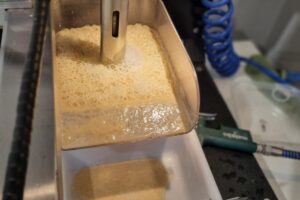- Researchers from the UPC are participating in the Quartz Enrichment Enabling Near-Zero Silicon (QUEEN) project, aimed at reducing the European Union’s dependence on external sources for critical raw materials, particularly metallurgical-grade silicon (MG-Si). To achieve this, the project proposes harnessing an underused resource: quartz sand from European quarries, to produce MG-Si locally, sustainably, and efficiently.
- A team from the Bioinspired Oral Biomaterials and Interfaces (BOBI) research group at the Department of Materials Science and Engineering (CEM) of the Universitat Politècnica de Catalunya - BarcelonaTech (UPC) is taking part in the European project HYDROHEAL, which explores how to transform bone fracture treatment using smart and advanced biomaterials, aiming to reduce the risk of infection and implant rejection, as well as shortening fracture recovery times.
- A multidisciplinary team of researchers from the Research Group in Smart and Sustainable Resources and Industries (RIIS), the Sustainable Mining Research Group (GREMS), and the Construction Materials and Roads (MATCAR) group at the Universitat Politècnica de Catalunya – BarcelonaTech (UPC) is leading the VALORFIN project. The aim is to develop a technological solution for the valorisation of the fine fraction of construction and demolition waste (CDW), transforming it into new low-CO₂-emission cementitious materials, while also reducing the presence of hazardous materials in this waste.
- A team led by the Electronic and Biomedical Instrumentation (IEB) research group at the Universitat Politècnica de Catalunya - BarcelonaTech (UPC) is developing an electronic chip that enables more objective detection of potential infractions in race walking, which are currently judged solely by visual observation. The technology, already tested in official competitions, provides accurate, objective, and fair data on race walkers’ loss of ground contact.
- The organisation CARBOPESCA, together with the research group Development Center of Remote Acquisition and Information Processing Systems (SARTI) and the Efficient and Robust Integrated Circuits and Systems (EFRICS) group, at the UPC, are leading the iPROPEZESPADA project, an initiative aimed at optimising the capture and management of swordfish fishing using artificial intelligence.
- 08/07/2025Project Headerrightno-repeat;left top;;auto20px The research groups River Dynamics and Hydrological Engineering (FLUMEN) and Construction Materials and Roads (MATCAR) at the Universitat Politècnica de Catalunya – BarcelonaTech […]
- The Laboratory of Applied Bioacoustics (LAB) at the Universitat Politècnica de Catalunya – BarcelonaTech (UPC) is leading the SEAMPHONI project. It aims to transform the monitoring of marine biodiversity through the creation of an intelligent marine digital twin that will integrate innovative tools such as environmental DNA, acoustics and underwater imaging.
- The Motion Control and Industrial Applications (MCIA) Research Group at the Universitat Politècnica de Catalunya - BarcelonaTech (UPC) is participating in the OPTIMA project, which aims to design and develop a high-efficiency, fully integrated bifacial photovoltaic system. This system is engineered for optimal performance and adaptability, particularly for installation on flat rooftops of buildings with high energy demands, such as commercial and industrial facilities.
- The UPCxels project, led by the Intelligent Data sciEnce and Artificial Intelligence Research Group (IDEAI-UPC) at the Universitat Politècnica de Catalunya - BarcelonaTech (UPC), aims to create an open, cross-sectoral platform for a shared data space across multiple fields, with a special focus on the agri-food sector.
- A multidisciplinary research team led by the Intelligent Data sciEnce and Artificial Intelligence Research Group (IDEAI-UPC) at the Universitat Politècnica de Catalunya - BarcelonaTech (UPC) is participating in the Agrixels project, which aims to create an agricultural information standard—essentially, a data ecosystem—designed for AI-based services in the agri-food sector.
- The Food Safety and Control Research Center (CRESCA) at the Universitat Politècnica de Catalunya – BarcelonaTech (UPC), in collaboration with the Aquamaris Foundation, has developed a system that allows irrigation using seawater without the need for filtration, desalination, or chemical treatment, both in agriculture and gardening. The new system enables the adaptation of ornamental garden plants and leafy vegetable crops, eliminating the need for fresh water entirely.
- The Environmental Engineering (ENMA) research group leads the WhATTer project with the aim of developing an innovative and sustainable solution for the treatment of textile wastewater through an electrochemical/alkaline electrolysis system that allows for simultaneous hydrogen production. The project is carried out in collaboration with the Textile Technology (TECTEX) and Polymeric Materials and Textile Chemistry (POLQUITEX) research groups at the facilities of the Institute of Textile Research and Industrial Cooperation of Terrassa (INTEXTER) at the Universitat Politècnica de Catalunya - BarcelonaTech (UPC).
- The Innovation in Materials and Molecular Engineering – Biomaterials for Regenerative Therapies (IMEM-BRT) research group at the Universitat Politècnica de Catalunya – BarcelonaTech (UPC), in collaboration with the Institute of Chemical Research of Catalonia (ICIQ), has developed polymer resins derived from plant-based materials to reduce the dependence of 3D printing on fossil fuel-based resins.
- The Centre for Technological Risk Studies (CERTEC) at the Universitat Politècnica de Catalunya – BarcelonaTech (UPC) is coordinating the European Program for Wildfire-Prepared Communities (FIREPRIME), a project designed to develop tools and services for wildfire prevention in Europe, with the goal of improving safety in the wildland-urban interface by actively involving the community in its own protection.
- The Resource Recovery and Environmental Management (R2EM) of the Center for Research in Multiscale Science and Engineering (CCEM) at the Universitat Politècnica de Catalunya - BarcelonaTech (UPC) is leading the HARMONIZE project, which focuses on the recovery and valorisation of ammonia from urban and industrial waste streams. The project is part of a larger initiative, MemTecWare, coordinated by the UCM.
- The digitalisation of human senses has advanced significantly in areas such as vision, hearing and touch. However, smell and taste continue to present a technological challenge, as their analysis relies on the identification of volatile or dissolved chemical compounds. While there are various sensors on the market capable of detecting specific gases and substances, they often lack the versatility required for comprehensive recognition of complex odours, showing limitations in adapting to different combinations of compounds.
















